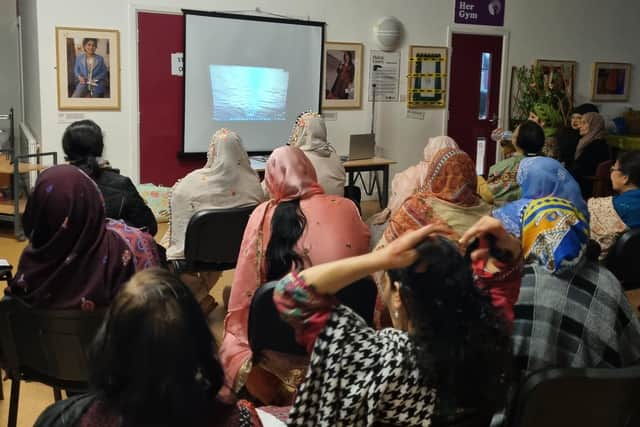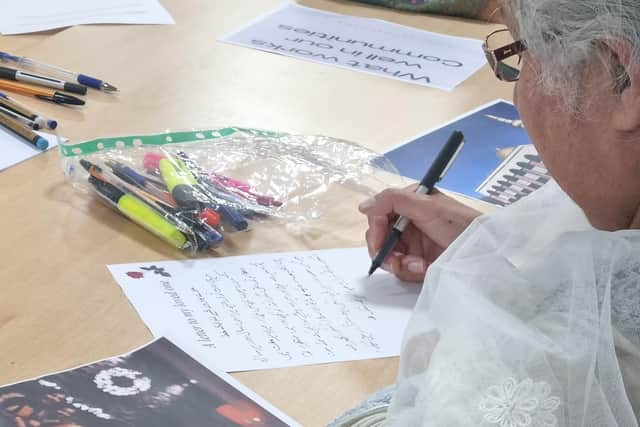How project captured experiences of Muslim Pakistani women around death, bereavement and end-of-life care
The Uncovering project set out to address the lack of safe spaces available to Muslim Pakistani women to connect and chat about the experience of death, dying, bereavement and caring.
Statistics show that there are large inequities between who accesses both hospice care and bereavement support.
Advertisement
Hide AdAdvertisement
Hide AdFor example, in 2016-2017, people of South Asian heritage in Bradford only made up eight per cent of referrals to specialist palliative care services, despite making up 47 per cent of the population.


Bereavement support services can be hard to access for families too, often depending on where and in whose care a relative has died.
Palliative care doctor Dr Jamilla Hussain, who is based in the city, was one of those who led the project. She says the Covid pandemic opened her eyes as a clinician to inequalities in access to services, including palliative care.
“We know nationally and also locally that people from minority ethnic groups, people from more deprived areas, are less likely to access specialist palliative care services at the end of their lives and they’re more likely to die in hospital rather than at home with their family members.
Advertisement
Hide AdAdvertisement
Hide Ad“Also a lot of palliative care is based on what white British middle class people consider to be a good end of life care experience.


"We haven’t really focused on what people from different backgrounds and cultures would really want and supporting that.”
Dr Hussain also points out that professional services often play just a small part in death, dying, grief and caring for people at the end of their lives.
“They’re really not medical events, they’re social events. They have always happened in communities and communities support each other through these events.
Advertisement
Hide AdAdvertisement
Hide Ad"The need for healthcare professionals is a small part of that. Perhaps we have over-medicalised death, dying and grief especially in the West.
"And actually what we should be doing is supporting communities to recognise the stuff that they do really well and supporting them to support themselves during these periods.”
Uncovering, run by WomenZone charity and community centre, Dr Hussain, poet Sharena Lee Satti and The Leap, Bradford, explored these topics.
“It was really important that this project was led by Pakistani women, for Pakistani women, in our community,” Dr Hussain explains.
Advertisement
Hide AdAdvertisement
Hide Ad“It helped us start with us, rather than the agenda and capacity of services.”
The series of workshops saw women share their experiences and work to produce creative writing and poetry to capture their thoughts.
Sharena says: “My aim was to give these women a space to share and express their pain and grief, through creative writing and poetry.
"I know from my own experiences how powerful poetry is and the healing and catharsis it can bring because I use it in my own work and I’ve used it in my own life.”
Advertisement
Hide AdAdvertisement
Hide AdShe adds: “The ladies in the beginning, when they were sharing their stories of grief and bereavement, very heartfelt and sad stories, there was a lot of emotion there, a lot of sadness and pain was coming out.
"By the end of the last workshop we did, these women were so empowered and there was laughing and joking and women were sharing their stories in a happy way.
"We went on a journey with the women, sharing through grief and bereavement but also celebrating life.”
Dr Hussain adds that whilst this was a promising start, there is still a long way to go to open up conversations around end-of-life in the community.
Advertisement
Hide AdAdvertisement
Hide Ad“We have scratched the surface of the importance for us to make space to talk about these issues with each other, and the strength and love we provide each other when doing so…
"And also the failings of wider society and services in providing equitable support for women like us and our loved ones.”
The project was funded by Hospice UK’s Dying Matters Community Grants programme, supported by end of life provider, Dignity.
